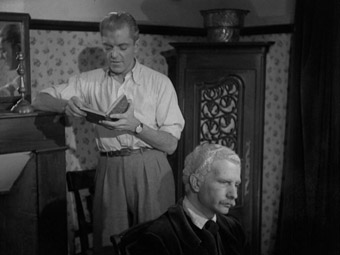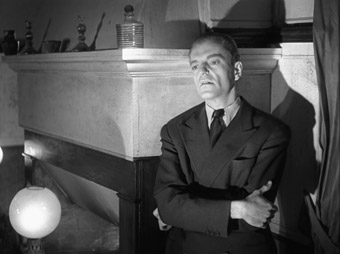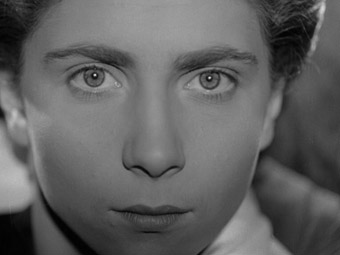|
In
the hopeful longing for even a flavour of cinematic truth,
I have something of a fascination for wartime stories, particularly those
involving life under occupation, something my generation
has never experienced and know only through the stories
of our elders. As time distances us further from the event,
at least as it affects those we may have known or be related
to, the truth is in danger of being usurped by the movie
version, which for the purposes of drama usually involves
an over-simplification of situation and character. That
generational distance makes it doubtful that many of today's
more aggressive ambassadors of youth could even conceive
of the idea of having to watch every word they said or look
they gave for fear of potentially fatal recrimination against
themselves and their family. Somehow I don't think "Don't
you tell me what to do!" would have got you very far
in Nazi-occupied France.
It's
that movie favourite of rooting for the underdog as they
do battle with the evil oppressor that I'm sure makes so
many of us believe that if we'd been in France during the
dark days of WW2 then we'd have joined the Resistance in a flash
and would have given those invaders what for at every opportunity.
We'd like to think that because our sense of justice demands
that we on some level fight for what we believe in and oppose injustice at every turn. But we weren't there
and most of us have never been in an even remotely similar
situation, one that we had to live with every day with no assurance
that it will ever come to an end. Such bravado is misplaced,
as true empathy and understanding is simply beyond us.

Resistance
comes in many forms, from direct action – that famed grey
area in which terrorist and freedom fighter are separated
only by semantics – to simple non-cooperation. Both methods
have their passionate supporters and stern critics, the
Violence Solves Nothing debate up against the charge that
passive resistance is only a step away from reluctant collaboration.
But in a situation controlled by absolute power, even the
smallest protest has its potentially serious consequences.
The
setup of Le Silence de la mer is deceivingly
simple. In 1941, during the occupation of France,
German officer Werner von Ebrennac is billeted with an old
man and his niece. The pair are hostile to the arrangement
and deeply resentful of this invasion of their property, and elect not to
communicate with Ebrennac or even acknowledge
his presence. But Ebrennac is not the unfeeling Nazi they
have presumably been expecting, but a polite, intelligent
and cultured man with a passion for France and its culture.
Every evening he joins his reluctant hosts and talks to
them enthusiastically about music and art and literature,
about his life and homeland and his love of their country.
The old man smokes his pipe and reads, his niece sits and sews –
both hear his words but neither speak nor react to him in
any way. Locational diversions aside, this is how the bulk
of the film plays, with Ebrennac addressing a determinedly
unresponsive audience. And yet he never gives up, never
becomes discouraged. On the contrary, he even expresses
admiration for their stance, for their love of their country.
With
the action initially restricted to one location and three
characters, and the conversation to a series of monologues to
which there is no direct response, you could be forgiven
for suspecting the film has stage play origins, were it not for the enigmatic
opening that firmly establishes the identity of the source
novel and its Resistance associations. It certainly has
the intrigue of good stage drama, not least in Ebrennac's
initially uncertain motivations. Is he a genuine Francophile
convinced that he can eventually break down the wall between
them, a lonely man in search for communication and debate, or an insecure oppressor desperate to convince the downtrodden
of his inner humanity? Or is he simply a self-deluded megalomaniac
who simply loves the sound of his own voice? Our conviction
of his sincerity grows with that of his unwilling audience,
his presence in France revealed to be as much a result of
naivité – he repeatedly expresses the view that Germany
and France will be united in "a beautiful marriage"
– as the desire to embrace a culture he has for so long
admired from afar.

The
foundation may have a theatrical feel but the presentation is richly
cinematic, the use of expressive camera angles, lighting
and mise-en-scène taking their cue as much from German
Expressionism as from Hollywood noir cinema. The visualisation
of Ebrennac's stories and memories, occasional at first
but building to in an extended and fateful visit to Paris,
are a winning blend of documentary realism (the uniformed
Ebrennac's exploration of the city's landmarks can't have
been an easy shoot just two years after the end of the war)
and more carefully staged sequences in which Ebrennac recalls
significant incidents from his past or meets with his colleagues
at an officers' club in Paris. Camera movement and framing
are used to powerfully augment the dialogue or drama, such
as the slow dolly in to a portrait of Hitler during a discussion
on the Treblinka extermination camp, or the chance meeting
of Ebrennac and the old man in the offices of the occupying
forces, faces caught in a mirror framed by images of the
German occupation.
Within
this framework, the occupants of the house start to undergo
subtle but telling changes. The uncle begins to listen to
words he remains outwardly unresponsive to, while he expresses in voice-over
a surprising disquiet at Ebrennac's temporary absence.
His grudging but gradually evolving respect for the man
also causes him to doubt the righteousness of his silent
stance, prompting him to remark that "it pains me to
offend anyone, even if he is an enemy." For his niece,
the developing emotional connection is more complex, and
one she later clearly has to fight to keep hidden, its temporary
escape caught in quiet but powerful close-up and represented
by just a look to camera and her only audible word of dialogue.
It's an extraordinary moment both for the story and for
cinema, a reminder that film does not need to shout to exert
emotional power, but speak in the right sort of whisper.
The
name of Jean-Pierre Melville should be a familiar one to
all true film devotees, not least for because he was responsible
for one of the greatest of all cult movies, 1967's Le
Samourai. Director of just 13 features in his 30-year
career, his work nonetheless had a considerable impact on
later filmmakers, his 1956 Bob le Flambeur having an apparently inspirational effect on French Novelle
Vague directors Jean Luc Godard and François Truffaut,
while his body of work has been cited by the usual suspects
of modern American indie cinema as a major influence. But
the path to movie-making success was not an easy one for
him. With no formal training and denied a technician's union
card, Melville set up his own production company, and for
this first project chose to make a film of a respected novel
without the author's consent, with a little known cast and
a cameraman similarly new to feature films. Such was his
confidence that he offered a deal to the book's famed author,
Vercors, that if the finished film didn't meet with the
approval of a jury of eminent former Resistance members
then he'd destroy it. His boldness paid off, and he was
even able to use Vercors' house as his principal location,
the very building in which the original story was written.

For
a first feature, Le Silence de la mer is
astonishing in its confidence and understanding of cinema,
something Melville learned through the appreciation of the
work of others, a trait more usually associated with the
so-called film generation of 1970s Hollywood. What begins
as a cautious plea for communication in the face of adversity
develops into a powerful and moving condemnation of the
perils of wish-fulfilling political naiveté. Featuring
a fine central performance from Howard Vernon in a difficult
role as Werner Von Ebrennac, Le
Silence de la mer fully deserves its reputation
as one of the finest of all post-war Resistance films. Dramatically
and cinematically compelling, its message of rebellion in
the face of overwhelming odds remains potent and relevant
to the politics of today, not least in the quote the old
man leaves for Ebrennac to read and consider: "It is
a fine thing when a soldier disobeys criminal orders."
Framed
in its original ratio of 1.33:1, the transfer has clearly
been made from a less than pristine original, with dust,
scratches and moisture damage all in evidence, although
digital restoration work has reduced much (though not all)
of it to the degree where it is not distracting. In other
respects the picture quality is impressive, with contrast
and detail both very pleasing.
The
Dolby 2.0 mono soundtrack has an inevitably narrow dynamic
range and a slight background hiss normal for films of this
vintage. Some sudden shifts in tonal clarity, sometimes
mid-sentence, suggest the restoration was made from more
than one print.
Ginette
Vincendeau on Le Silence de la mer (21:59)
Recorded in March 2007 in London's The Flea Pit, this interview
with Ginette Vincendeau, author of the BFI's Jean-Pierre
Melville: An American in Paris, focuses specifically
on Le Silence de la mer, from its conception
through to its release. Vincendeau is infectiously enthusiastic
for and knowledgeable of her subject, but how much you learn
from this will depend in part on whether you watch it before
of after you read...
Masters
of Cinema Booklet
The booklets that accompany Masters of Cinema releases are
always handsomely produced and interesting to read, but
this is one of its best yet, not so much for volume but
the sheer quality of the content. Divided into two unequal
halves, the first 34 pages are devoted to a sizeable extract
from Ginette Vincendeau's above-mentioned book, a fascinating
and information-packed read that will expand your appreciation
of the film and should sell a few copies of the work it
is taken from, though inevitably, there is considerable crossover
with the above interview. The final 17 pages comprise an
interview with Melville in which the director discusses
in delightful detail Le Silence de la mer
with interviewer Rui Nogueira, translated into English by
Tom Milne in 1971 for the BFI. Long out of print, this is
a most welcome and enjoyable inclusion.
A
remarkable first feature whose production is a story in
itself, Le Silence de la mer is so much
more detailed and layered than its seemingly simple structure
might suggest. A gripping and ultimately moving drama, its
politics may be of its time but still has lessons for today,
while its humanism should speak to any generation prepared
to listen. The Masters of Cinema disc does as well as can
be expected with the original material, and although short
on extra features, that booklet counts for a lot. Recommended.
|